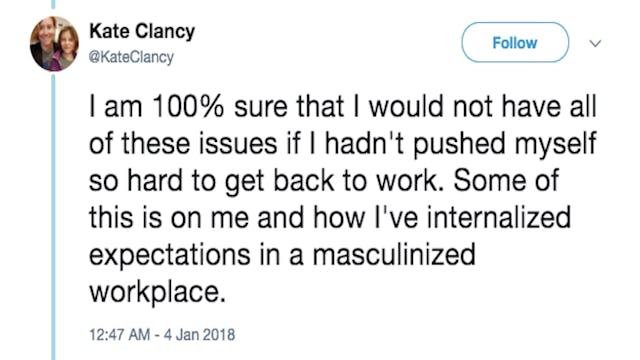Twitter Thread Nails Why Maternity Leave Matters For Both Babies And Moms

Postpartum moms facing physical obstacles rarely get the time they need before returning to work
Overall, maternity leave in the United States is a mediocre at best, dismal at worst. Financial strain usually means moms are back to work much sooner than they want to be or should have to be, which isn’t always a physically or mentally sound solution for new moms. One mom’s thread perfectly nails why adequate time at home matters.
New mom and anthropology professor Kate Clancy does a perfect job at highlighting how the pressure for moms to get back to work can have a disastrous, snowballing effect.
Clancy, who gave birth to her second child in August, shares a list of the many complications she experienced surrounding the birth and immediately afterward.
No woman enjoys talking about her medical complications, especially on a public platform. But perhaps because we’re not talking about it more, that’s part of the problem. It’s easy for society — and, more specifically, employers — to forget that giving birth is a massive medical event. One that requires serious recuperation and time for adjustment — which for many women, is no more than six weeks. Or less.
She’s absolutely right. What’s even crazier is how common many of these serious medical complications really are with new moms. And while they may be common, they’re no less serious. Postpartum issues like Clancy’s add even more hurdles to overcome during maternity leave.
BINGO. Everyone cares about you when you’re pregnant, but the second that baby is out — forget it. You no longer exist to the medical community. You are a vessel of nutrition and Provider Of All Things Baby Needs, so it doesn’t matter how you’re struggling — you’ve got to be everything for your baby no matter what. Oh, and you boss wants you back to work posthaste. In a word, it suuuucks. And it’s such a disservice to mothers.
Maternity leave is about bonding, no doubt about it. But it’s also about so much more — especially when you factor in recovery from delivery, physical setbacks like fissures and mastitis, and just the overall mental burden that comes with being a new mom (hello, anxiety and exhaustion). Add in the pressure to get back to work and maternity leave in the United States, as Clancy expertly educates, is practically a recipe for disaster.
Bottom line: if we want to do what’s best for our babies, we’ve got to start by doing what’s best for our moms.